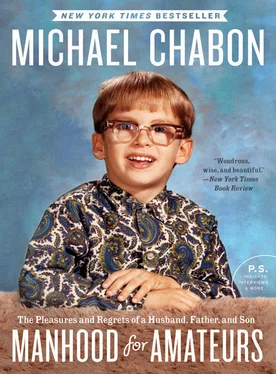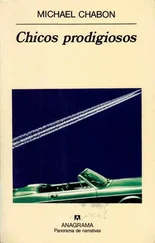Michael Chabon - Manhood for Amateurs
Здесь есть возможность читать онлайн «Michael Chabon - Manhood for Amateurs» — ознакомительный отрывок электронной книги совершенно бесплатно, а после прочтения отрывка купить полную версию. В некоторых случаях можно слушать аудио, скачать через торрент в формате fb2 и присутствует краткое содержание. Год выпуска: 2010, Издательство: Harper Perennial, Жанр: Биографии и Мемуары, Публицистика, на английском языке. Описание произведения, (предисловие) а так же отзывы посетителей доступны на портале библиотеки ЛибКат.
- Название:Manhood for Amateurs
- Автор:
- Издательство:Harper Perennial
- Жанр:
- Год:2010
- ISBN:нет данных
- Рейтинг книги:4 / 5. Голосов: 1
-
Избранное:Добавить в избранное
- Отзывы:
-
Ваша оценка:
- 80
- 1
- 2
- 3
- 4
- 5
Manhood for Amateurs: краткое содержание, описание и аннотация
Предлагаем к чтению аннотацию, описание, краткое содержание или предисловие (зависит от того, что написал сам автор книги «Manhood for Amateurs»). Если вы не нашли необходимую информацию о книге — напишите в комментариях, мы постараемся отыскать её.
is the first sustained work of personal writing from Pulitzer Prize-winning author Michael Chabon. In these insightful, provocative, slyly interlinked essays, one of our most brilliant and humane writers addresses with his characteristic warmth and lyric wit the all-important question: What does it mean to be a man today?
Manhood for Amateurs — читать онлайн ознакомительный отрывок
Ниже представлен текст книги, разбитый по страницам. Система сохранения места последней прочитанной страницы, позволяет с удобством читать онлайн бесплатно книгу «Manhood for Amateurs», без необходимости каждый раз заново искать на чём Вы остановились. Поставьте закладку, и сможете в любой момент перейти на страницу, на которой закончили чтение.
Интервал:
Закладка:
P.S
About the Author
Meet Michael Chabon
MICHAEL CHABON is the author of six novels, among them The Mysteries of Pittsburgh, Wonder Boys, The Yiddish Policemen’S Union , and The Amazing Adventures of Kavalier & Clay , winner of the Pulitzer Prize. He’s written two collections of stories, edited not just an edition of the Best American Short Stories but also two collections of writing for McSweeney’s, and this week he publishes his second collection of essays, Manhood for Amateurs .
Here are some simple facts about him. He is a virtuosic storyteller, a master of large-hearted, complex works of literature that integrate colossal slabs of culture and history with a fearless, wild imagination. If he is subversive, weird, and drawn to the uncharted playing fields of the human project, he is equally a writer of the most vibrant feeling, able to pin a reader’s sympathies to the most diverse group of characters. What is this talent, getting us to care more for people who don’t exist than we do about our own family members? Not sure what to call it, but Chabon has a big dose of it. More facts. He is a narrative writer with the immersive gifts of Dickens. A complex cast of characters test their desires and run from their fears in his books, or they deny their desires and perilously confront what terrorizes them. You can be sure that the conflict that arises in his novels — the spectacle of humans picking away at each other’s weaknesses — comes from some ineffable, organic place and suddenly overwhelms us with its inevitability.
“When I read his work, I see … a writer who draws from the whole tool kit of storytelling, using whatever resources and riches suit his material.”
A lot is made of how Chabon traverses the boundaries between several literary genres: the mystery, the hard-boiled detective noir, fantasy, science fiction, and plain old literature. Maybe some others. But when I read his work, I see no traversing at all but rather a writer who draws from the whole tool kit of storytelling, using whatever resources and riches suit his material. I see no conscious blending of high and low forms, no attempt to domesticate science fiction or elevate the mystery to the status of literature. Chabon is a writer who shows us how inexhaustible the methods of storytelling really are, and he uses the available techniques that bring his worlds fully to life. By ignoring the distinctions between genres, he creates a genre unto himself. In so doing, he connects us to the very foundations of literature — literature as a spell, literature as magic, before there were bookstores to worry about the question of categories.
And does it really matter what the genre is when the resulting work is more blown out with color and feeling than the life we live outside of books? I am sometimes saddened to think that I have to read novels like Chabon’s to experience the fullness, the complexity of life. But it’s true. In his language we can meet the great contradictions of the species, hear the most difficult secrets, and simply watch vivid spectacles unfold, none of which ever quite happens — at least to this lush degree — in what is known as real life.
“[Chabon] connects us to the very foundations of literature — literature as a spell, literature as magic, before there were bookstores to worry about the question of categories”
The point is, the experiences he makes in his novels can only be found there, which makes his work all the more exceptional. His books add something new to the world, a depth of reality only possible through his artful arrangement of language. This is the most powerful argument for literature that I know. Without his books we would be missing a part of the world. They provide a space for what could not happen otherwise. Our world would be lonely and incomplete without his books, and we’re lucky to have him here with us today. 
About the book
Subwoofer Submarine
I JUST SPENT EIGHT WEEKS working on a screenplay ten hours a day while listening to the same three albums — Popol Vuh, Einsjäger & Siebenjäger (1974); The Six Parts Seven, Casually Smashed to Pieces (2007); and the Jerome Moross soundtrack to the 1958 film The Big Country —on infinite repeat. All the tracks were AAC files that I had downloaded from the iTunes Music Store, and I was listening to them through a pair of small, attractive podules that connected to my iMac through its FireWire port. This is, roughly, the setup that I have been using for a long time now, since before there was an iTunes, or an iPod, or a Napster, back when the only MP3s available were those you had ripped yourself. And though I also listen to music in the kitchen, in the car, on airplanes, and while running, given the amount of time that I spend at my desk, and the fact that I listen to music constantly while writing, over the past ten years I have probably listened to more music in the form of MP3s playing through cute little pods placed about three feet from my head than in any other way. So I was surprised, last week, when for no apparent reason, while writing a big Martian air battle scene, I looked up from the iMac’s monitor to one of those cute little FireWire ovoids, as Vuh lead guitarist Daniel Fichelscher attempted unbelievably intricate and beautiful things on the title track of Einsjäger , and thought: Dude, what’s with the Fisher Price speakers?
You might suppose that repetition would have dulled my powers of aural discernment — this must have been the fiftieth or sixtieth time I’d listened to the track over the past two months— but on the contrary, it abruptly seemed to have heightened them, to have broken through the dam of convenience, simplicity, and ready access to the music, to have flooded my jaded ear with sudden understanding. I’m no audiophile; I want to say that right off. I have no idea what impedance is, or how to set the levels of an equalizer with any confidence or panache, and I still find infantile amusement in saying the word “woofer.” But it struck me all at once that the sound quality of the music I’d been listening to so heavily, with the indirect attentiveness I give music when I’m writing, was thin, brittle; all sheen and no depth. It was tinny, tiny, and pallid. It sounded like shit, in fact; and not only did it sound like shit, but it had been sounding like shit for years. Shit in the kitchen, playing from a big hard drive attached to an old PowerBook, through a couple of small, flush-mounted wall speakers. Shit in the minivan and the Prius, patched from an iPod through factory-installed speakers greased over with a scurf of children and their miasmas. Shit through the endless, vaguely rattling series of earbuds — that nauseating term, with its suggestion of Van Goghesque mutilations — accompanying me on morning runs and onto airplanes. The digitized music itself “compressed,” “lossy,” reduced to a state of parity with whatever system I consigned it to. With the possible exception of books, I love music more than I love anything in my life that is not a person or a dog. At one time, I now realized, I had known how to express and indulge and nourish that love: with iron-heavy black records, a fifty-watt amplifier, and a pair of speakers that were themselves pieces of furniture, far too large for any desktop. I hit the space bar, stopping the music, and observed a moment of silence for my own lossy life, and thought about a man whom I had not seen in almost thirty years.
My mother’s ex-boyfriend took me to buy my first stereo system, her present to me for graduating with the Howard High School Class of 1980. He was studying electrical engineering at the University of Maryland, his name was Bill Warriner, and I loved him. Bill was quite a bit younger than my mother, who was herself not yet thirty-eight that spring. He wore his lank, sandy hair long, and he took me seriously in precisely the same measure as he found me amusing. He was a wide-eyed, soft-spoken Midwestern guy who had been in the Army and played in local dance bands back in his hometown. I seem to recall that he was a drummer, and I remember his telling me that the only time he ever stepped to the microphone during a gig was when the lights went down and it was time to sing “If,” by Bread, with its line about all the stars going out one by one, and how that would not necessarily be such a bad thing, in the right company. I never hear that song without picturing it being sung by Bill Warriner. He was the first adult I ever knew who felt, and knew how to express, if only through the passion of his talk about changes in band personnel and hidden meanings in song lyrics and unexpected chord progressions, the central truth I was then only just beginning to grasp: that my life was compounded out of discrete particles of time, and that those moments were built, in turn, out of the matter of rock and roll.
Читать дальшеИнтервал:
Закладка:
Похожие книги на «Manhood for Amateurs»
Представляем Вашему вниманию похожие книги на «Manhood for Amateurs» списком для выбора. Мы отобрали схожую по названию и смыслу литературу в надежде предоставить читателям больше вариантов отыскать новые, интересные, ещё непрочитанные произведения.
Обсуждение, отзывы о книге «Manhood for Amateurs» и просто собственные мнения читателей. Оставьте ваши комментарии, напишите, что Вы думаете о произведении, его смысле или главных героях. Укажите что конкретно понравилось, а что нет, и почему Вы так считаете.












